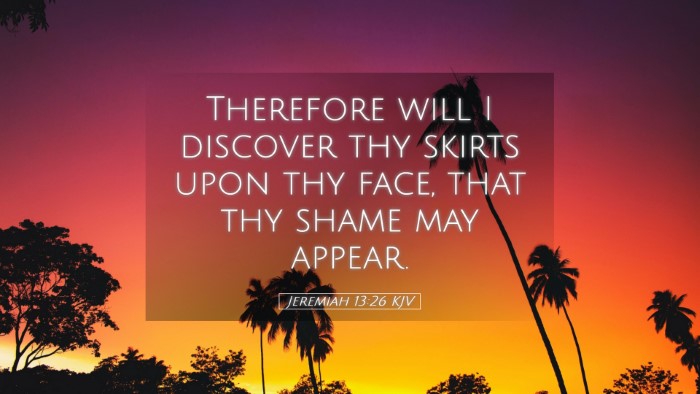Commentary on Jeremiah 13:26
Jeremiah 13:26 states, "Therefore will I discover thy skirts upon thy face, that thy shame may appear." This powerful verse serves as a vivid metaphor emphasizing the concept of exposure and disgrace. Various commentators provide insight into the implications and meanings behind this striking passage.
Contextual Background
The book of Jeremiah is primarily a prophetic work written during a tumultuous period in Judah's history. The prophet Jeremiah was tasked with delivering God's messages of warning and judgment against the idolatry and moral decay of the people. This specific verse belongs to a passage where God uses symbolic actions to illustrate the coming judgment.
Matthew Henry's Commentary
Matthew Henry offers a detailed examination, emphasizing that the exposure of shame is a direct consequence of sin. He interprets the act of uncovering as a divine revelation of the people’s disgrace. The metaphor of “skirts” represents the societal and spiritual covering that the people believed protected them.
- Divine Judgment: Henry claims that the discovery of the skirts signifies God's judgment, exposing the false security of the people.
- Call to Repentance: He says that this act isn't merely punitive; rather, it serves to alert the people to their fallen state, prompting them to seek repentance.
- Moral Exposure: The exposure of skirts reflects the necessity of acknowledging sin publicly, highlighting that hidden sins will ultimately be made known.
Albert Barnes' Commentary
Albert Barnes expands on the thematic elements of shame and vulnerability present in this verse. He suggests that the directive to "discover thy skirts" encapsulates a fuller understanding of both the internal and external consequences of disobedience.
- Symbolism of Skirts: Barnes elucidates that skirts symbolize feminine modesty, implying that the exposure speaks to breaking societal norms, leading to public humiliation.
- Judgment as Revelation: He argues that God's judgment often manifests as a revelation of truth, where the facade of righteousness is stripped away to reveal true character.
- Reflection on National Shame: Strikingly, Barnes mentions the implications for the nation as a whole, suggesting that collective sin leads to collective shame.
Adam Clarke's Commentary
Adam Clarke provides a comprehensive exegesis, focusing on the implications of the act of uncovering in the socio-religious context of ancient Israel. He notes the significance of skirts in the depiction of modesty and dignity, and their exposure signals a complete disgrace.
- Cultural Context: Clarke points out that modest attire was deeply rooted in the culture, making this revelation doubly humiliating for the people.
- God's Purpose: He stresses that the divine intent behind such exposure is not solely punitive but is also intended as a corrective measure aimed at leading the people back to righteousness.
- Lesson on Sin’s Consequences: Clarke draws out that this serves as a universal lesson regarding the consequences of sin, reminding readers of the eventual culmination of living in rebellion against God.
Theological Implications
The exposure represented in Jeremiah 13:26 invites deep reflection on several theological themes:
- Holiness of God: The passage illustrates God's holiness and His intolerance for sin, underscoring His role as a righteous judge.
- Human Accountability: It emphasizes the necessity for individuals and nations to recognize and confess their failings before God.
- Grace and Mercy: Although judgment is rendered, the underlying purpose is always to restore, offering a chance for redemption and grace.
Application for Today's Believers
This verse holds relevance for contemporary readers, showing the importance of self-examination and the need for transparency before God.
- Self-Reflection: Individuals are encouraged to reflect on their spiritual state, acknowledging areas where they may be hiding their sins.
- Community Confession: Churches can take this lesson to heart, fostering environments that prioritize confession and accountability.
- Hope for Restoration: Finally, it is essential to remember that while shame may be painful, the ultimate goal of God’s discipline is to lead back His people to restoration.
Concluding Thoughts
Jeremiah 13:26 serves as a somber yet enlightening reminder of the consequences of wandering from God's path. It calls individuals, churches, and nations to take heed of their ways, exposing unconfessed sin while also highlighting the hope found in repentance. As believers continue to navigate moral complexities in a modern context, these insights from Scripture and historical commentaries remind them of the timeless call to holiness and the redemptive nature of God's discipline.


